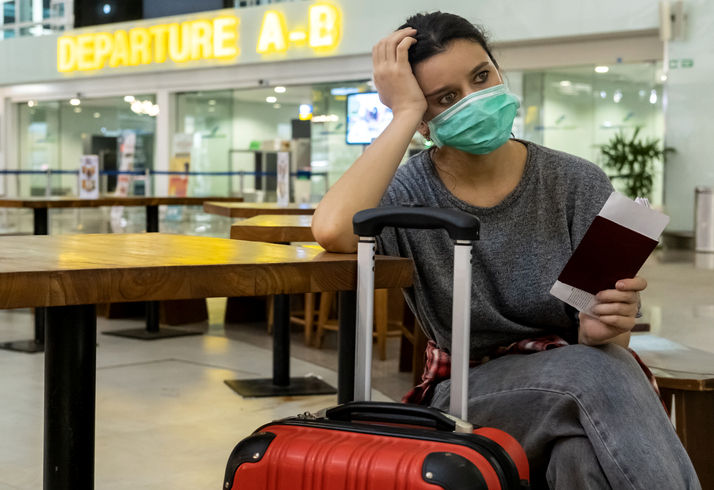Current COVID-19 Restrictions for Entering the UK, Spain, Greece and Italy
Following the most recent lockdown, Imelda Reddington, Head of Immigration, considers the new COVID-19 restrictions for entering the UK and other European countries.
Further to the Government’s announcement on 4 January 2021, the UK has since entered its third national lockdown but has been in and out of lockdown since March 2020. As a result the UK, along with many other countries, have imposed travel restrictions which will be discussed below.
UK Travel Restrictions
Prior to entering the UK, travellers will need to completing an passenger locator form within 48 hours of arrival. Evidence that this has been completed will be requested at the UK border. This is the case regardless of where they travel from including a country on the travel corridors list.
Not having this form could result in a fine once reaching the UK and travellers may also be refused entry unless they are a British or UK resident. The only exemptions from completing the form are people who travel from Ireland, the Channel Islands or the Isle of Man and were there for more than 10 days.
Upon arrival, travellers will be required to self-isolate for up to 10 days unless they have travelled from a country, territory or region that is on the travel corridors list (https://www.gov.uk/guidance/coronavirus-covid-19-travel-corridors). Fines of up to £10,000 may be issued if travellers breach their self-isolation restrictions although they utilise the Test to Release scheme which involves paying for a private COVID-19 test.
Spain Travel Restrictions
As of 23 November 2020, travellers who intend to travel to Spain must provide a certificate confirming that they have a negative COVID-19 test conducted up to 72 hours prior to their arrival if travelling from a country identified as ‘at risk’. Children under 6 years old are exempt from taking this test.
The certificate must be the original document and satisfy the following:
- Must be written in Spanish, English, French or German; and
- Must contain the traveller’s name, passport or ID number, test date, identification and contact details of the centre where they had the test carried out, the technique used and the test result.
The list of at risk companies takes effect from 11 January 2021 and is reviewed every 15 days (https://www.mscbs.gob.es/en/profesionales/saludPublica/ccayes/alertasActual/nCov/spth.htm).
GREECE Travel Restrictions
Travellers must complete a passenger locator form prior to entering Greece. This requires travellers to confirm where they are travelling from, the duration of their stay(s) in any other countries as well as where the intend to reside once arriving in Greece.
Travellers will also need to provide a negative test result for COVID-19 carried out up to 72 hours prior to their arrival. Children under 10 years old are exempt. The test results should be presented on a certificate which is written in English and includes the name and passport number of the traveller.
The test centres that carry out the test must be one of the following otherwise the certificate may not be accepted and entry to the country could be refused:-
- National Reference laboratories;
- National Public Health Laboratories; or
- Private laboratories which are accredited from the respective national accreditation authorities (not necessarily specifically for COVID-19).
Travellers may be randomly selected for a COVID-19 test upon arrival.
ITALY Travel Restrictions
Prior to travel, a self-declaration form from the Ministry of Foreign Affairs must be completed. This is to be provided to the airline or transport provider.
Countries have been categorised into various Lists and depending on where the travellers pass through or travel from, the requirements may differ as follows:-
- List A
- No travel restrictions
- List B
- Travel is permitted without requirement of any certificate confirming the reason behind the journey.
- No obligation of self-isolation nor the need for a negative COVID-19 test unless the traveller passes through a country set out in Lists C-E within 14 days prior to travelling to Italy.
- List C
- Travellers arriving from a country in List C must provide a certificate evidencing a negative COVID-19 test carried out within 48 hours prior to entering Italy.
- Failure to provide such a certificate will mean having to self-isolate.
- A certificate confirming a negative COVID-19 test carried out up to 72 hours before arrival must be provided.
- List D
- Similarly to countries in List C, travellers will not require a certificate setting out their reasons for travel.
- Travellers will need to self-isolate for a period of 14 days if arriving from any countries contained in this List.
- A certificate confirming a negative COVID-19 test carried out up to 72 hours before arrival must be provided.
- List E
- Travel from a country within this category may only be done so for work, health or study, absolute emergencies or to return to one’s domicile, home or residence.
- Self-isolation will be required for 14 days.
- A certificate confirming a negative COVID-19 test carried out up to 72 hours before arrival must be provided.

